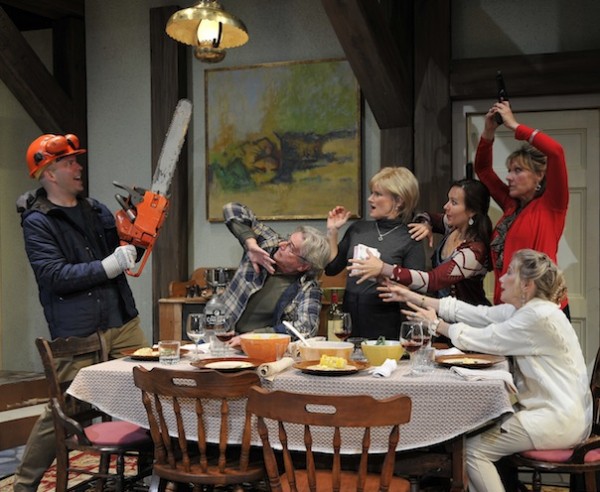Theater Review: “The Granite State” — Good, Not Great, Entertainment for a Summer’s Eve in New Hampshire
Charles Morey’s new comedy focuses on the trials and tribulations of aging writers. Most of its humor revolves around the past, while its plot hinges on the present and future.
The Granite State written and directed by Charles Morey. Staged by the Peterborough Players, Peterborough, New Hampshire, through August 3.

Tom Frey, Anderson Matthews, Beverly Ward, Karron Graves, Lisa Bostnar and Joyce Cohen in moment of mayhem in the Peterborough Players production of The Granite State. Photo: Deb Porter-Hayes.
By Jim Kates
Before I begin writing about this production, I have to declare a dog of my own in this fight. Early in the drafting of The Granite State, the playwright, Charles Morey, ran his script (now receiving its world premiere production via the Peterborough Players) by me for some minor advice. He took some of what I offered, and declined other suggestions. And so my watching of the play in its present form is colored by particular expectations, as well as by expectations raised from Morey’s earlier delightful farce set in the same neighborhood, Laughing Stock, performed to success at home and abroad.
The Granite State is no Laughing Stock, which drew intimately on the summer theater world of the Peterborough Players themselves. While staying close to home, the new play takes on a more generalized milieu of aging writers. Most of its comedy revolves around the past, while its plot hinges on the present and future.
The premise is this: An established literary figure learns that he has been awarded a prestigious and lucrative international award. Simultaneously with his worry that the honor will not only solidify his reputation but also petrify creative juices already gelled by mourning for his most recent wife, turning him into a “frozen monument of lifetime achievement” — one meaning of “the granite state” of the title — he is descended upon by two ex-wives, a son and a future daughter-in-law, as well as his current romantic interest, all of whom have their own stake in his good fortune. The disentangling occupies two acts set in an inherited house in Hancock, New Hampshire, “the Granite State.”
This locale looms large, because the play derives much of its energy from references that may not travel very well, but that prove knowingly satisfactory among the Peterborough Players, just over the town line from real-life Hancock. Characters, like those in Laughing Stock, are drawn from known originals. The audience gleefully responds to a recognition of Rosaly’s Farmstand or the nearby city of Keene. Equally, political and topical allusions — to Rick Perry and Ted Cruz, for instance — may end up dating the play quickly, without extrapolation into the wider and more long-lasting country of art. Jokes at the expense of Texas may not wear well. The Granite State feels very much bound to its time and place. That may be just because I, too, am of its time and place, and share in these recognitions. Others farther and further away may find these references less critical to the humor, but the life of the play is generated from the outside, not from inside itself.
I wish I liked the people in it better. Anderson Matthews did not generate any sympathy for George Gordon, the loquacious and irascible writer who tools around the stage pretty much on one note through two acts. We have no reason to like his first and potentially blackmailing wife from the instant she comes into view. Beverly Ward establishes Claire’s villainy from her very first lacquered appearance, but (at least on first night) she stayed rather wooden throughout. The most approachable characters are Anna, George’s second wife, the only truly pleasant person on stage, played with remarkable verve and jauntiness by Joyce Cohen; and Yelizaveta, to whom Lisa Bostnar brings an understanding she communicates effectively to the audience. These two women really care about George, in their separate ways, and their caring warms their characters. They are also the only figures George really cares about.
His son Tom (Tom Frey) functions more for plot than character, and Tom’s fiancée Carrie (Karron Graves) suddenly falls into a little tornado of venality that unbalances and disrupts her otherwise genial supporting role. As Morey has written and Graves plays her, the aberration seems to come from nowhere and go nowhere, and to serve no purpose except to remind everyone onstage and off of the corrupting power of the possibility of profit.
A playwright who directs his own play does not give a critic a lot of scope for a discussion of interpretation. The appropriate aim of a premiere production is to put the play on, far more than to play off it, to see where it can be taken. And so Morey does, ably and with a full knowlege of the company, which he knows well. It may be significant that one of the most subtle, comic scenes of The Granite State is virtually wordless: a marvelous ballet of table-setting in Act II. Here director Morey clearly has taken over from author Morey.
For George Gordon, of course, everything comes out right enough in the end. He has overcome his most pressing trials and most of those tribulations have gone off to separate beds. If he doesn’t have everything he wants, well, that’s one of the lessons he has learned about aging. If audience members haven’t got everything they want, they can rest assured that enough is as good as a feast, and that The Granite State is good, but not great, entertainment for a summer night in new Hampshire.
Jim Kates is a poet, feature journalist and reviewer, literary translator and the president and co-director of Zephyr Press, a non-profit press that focuses on contemporary works in translation from Russia, Eastern Europe and Asia.
